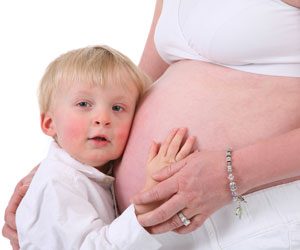 Many of us cannot imagine starting a day without a cup of tea or coffee and for some a can of cola or an afternoon cuppa is like a means to survival! Tea, coffee and cola all contain caffeine which is a stimulant and for many is what kick-starts them into their day and keeps them going. However caffeine can have harmful effects on anyone’s body and in addition caffeine during pregnancy has been shown to have potentially harmful effects on mothers and babies. If you are trying to conceive or already pregnant you may want to reconsider your caffeine intake or chose to eliminate it from your diet altogether.
Many of us cannot imagine starting a day without a cup of tea or coffee and for some a can of cola or an afternoon cuppa is like a means to survival! Tea, coffee and cola all contain caffeine which is a stimulant and for many is what kick-starts them into their day and keeps them going. However caffeine can have harmful effects on anyone’s body and in addition caffeine during pregnancy has been shown to have potentially harmful effects on mothers and babies. If you are trying to conceive or already pregnant you may want to reconsider your caffeine intake or chose to eliminate it from your diet altogether.
Effects of caffeine on the body
As we have stated caffeine is a stimulant, so by nature, it increases your heart rate and speeds up your metabolism. That said many activities have the same effects. This includes racing to catch the train, rushing to get children out the door to school on time, or trying to meet that pressing work deadline. Your body interprets the signals created by rushing, the same way as it interprets the signals created by caffeine – as stress. Therefore if you consume caffeine during pregnancy it can create brief bouts of foetal stress, and we all know that generally speaking stress is not good.
That said, drinking the odd cup of tea or coffee is unlikely to be harmful to your baby, any more than those briefly stressful activities we mentioned. However, if the stress in your life is relentless, this can have a significant impact on your baby. In the same way, consuming large amounts of caffeine during pregnancy can impact your baby’s health and well-being.
Beyond the stress which is induced in your body, caffeine has other potentially harmful effects. Because caffeine is a stimulant. It is addictive and the interplay between caffeine and your nervous system can cause headaches, insomnia and increased anxiety. Caffeine is also a diuretic which means that it promotes the loss of water from the body (dehydration). Interestingly tea and coffee have also been shown to interfere with the body’s ability to absorb iron if drunk with or close to meals.
When you are pregnant, ensuring your body has enough water, that you get enough sleep, and that you maintain a state of calm are cornerstones of good health. For many women, keeping their iron stores up throughout pregnancy can also be a challenge. Consuming caffeine during pregnancy, therefore, reduces your ability to achieve these objectives. Keeping in mind that caffeine crosses the placenta, the harmful effects of caffeine during pregnancy directly affect your baby as well as you.
Sources of caffeine
While the most obvious sources of caffeine are tea, coffee and cola, chocolate also contains caffeine. (whether as a drink or in a bar). It is important to note too that green tea contains only a little less caffeine than black tea so is not a viable substitute. In addition, most energy drinks contain caffeine, as do over-the-counter medicines. This includes headache and cold tablets, allergy remedies, some slimming supplements, and medications designed to help you stay awake.
Recommended intakes
There has been a range of research completed on the use of caffeine during pregnancy, with varying results. Some studies have shown that excessive caffeine consumption can cause a lower birth weight in babies, which can in turn lead to other complications and health issues at birth and later. A study published in the American Journal of Obstetrics & Gynaecology drew the conclusion that low to moderate levels of caffeine consumption doubles the risk of miscarriage. Other studies have not supported this stance.
So what does this conflicting evidence mean? While we can’t state resolutely that caffeine will most definitely cause harm to your baby, we can also not say with conviction that caffeine during pregnancy is safe. This is the very reason why exercising caution is a good idea when it comes to caffeine during pregnancy.
In order to avoid the negative effects of caffeine NSW Health recommends an intake of no more than 600 mg per day for all of us. Further, limiting caffeine during pregnancy to a maximum of 200mg per day is recommended. Keeping this in mind, the following chart can give an inkling to how much caffeine you are consuming (as well as how fast it can add up!):
If viewing on a mobile phone slide the table across to view the information
| Tea: cup | up to 90 mg depending on strength |
| Decaffeinated Coffee: cup | up to 4 mg depending on brand |
| Instant Coffee: mug, cup | 100 mg, 75 mg |
| Fresh Coffee (percolated, plunger, filter, etc.): cup | 100 mg to 350 mg depending on beans |
| Cola: can | 40 mg |
| Hot Chocolate (or cocoa): cup | up to 70 mg |
| Energy Drinks: can | 80 mg |
| Chocolate Bar: 50 g | 25 mg to 50 mg |
Tips for reducing your intake
The idea of cutting back on tea or coffee can seem like cutting off a limb for some. However, you don’t have to cut out tea and coffee altogether. Anything you do to reduce your intake of caffeine during pregnancy is a good thing. If you would like to cut back your intake of tea or coffee you might find these tips useful:
- Brew tea for a shorter time. Tea brewed for 1 minute has significantly less caffeine than tea brewed for 5 minutes
- Step your tea for 30 seconds. Discard the tea, and then make your cup with the same teabag. In that way, more caffeine is released on contact with the boiling water than later in the stepping process
- Switch to decaffeinated tea or coffee, or if that seems like torture make every second cup decaf
- Consider substituting some of your intake with a tasty herbal tea but make sure it actually is caffeine free and that it is safe in pregnancy
- Choose decaffeinated cola rather than the regular variety, or check different brands for one that has less caffeine
- Switch from freshly brewed coffee to instant coffee
Combating caffeine withdrawal
Because caffeine is addictive, reducing your intake can cause symptoms of withdrawal. These include headaches, fatigue, anxiety and a reduced ability to control your emotions. None of these is good during pregnancy. The answer is to reduce your intake slowly. One way to do so is to reduce the amount of coffee and tea you drink. One cup per day.
If you think you will have trouble keeping track of your tea or coffee intake, using something visual to guide you can help. Consider placing a specific number of tea bags or teaspoons of coffee in a jar each night. Consume it only the next day. Slowly reduce what you put in the jar as well as employ some of our other tips. If that seems too fiddly, set a target and keep a tally of the number of cups you drink.
While it is important to reduce your caffeine intake try to be as gentle as you can on yourself, keeping in mind that caffeine withdrawal impacts your baby too!
Beyond pregnancy – breastfeeding
Beyond pregnancy, caffeine is also transmitted in breast milk. Some babies don’t show adverse reactions to a low level of caffeine intake by their mothers. Other babies become fussy and have poor sleep patterns. This is the result of the caffeine they are consuming through breast milk. Continuing your low-caffeine regime into the breastfeeding years makes good sense for both your own health and that of your baby.



Recent Comments